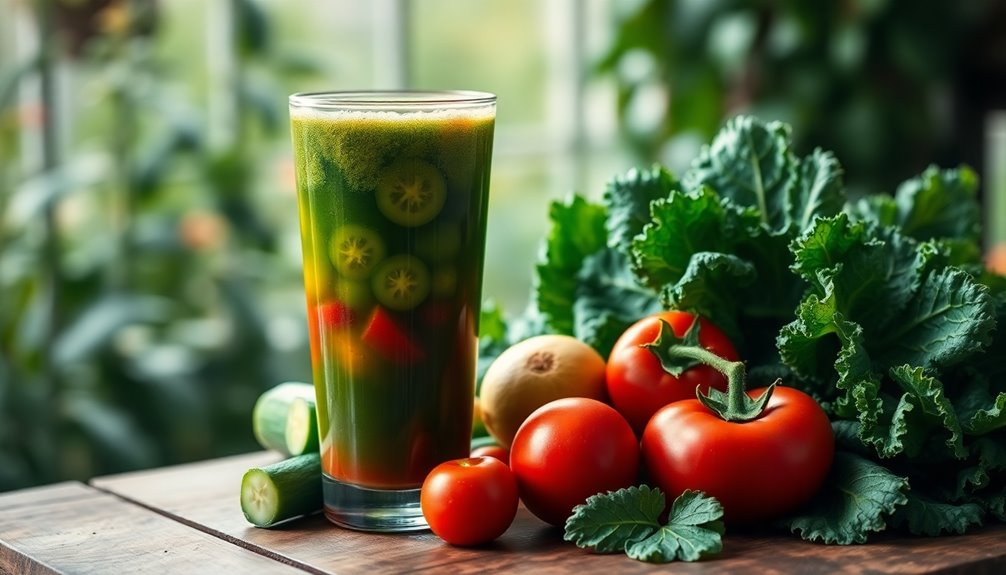Organic vegetable juice packs a nutrient-dense punch, delivering essential vitamins, minerals, and antioxidants that boost your immune health and protect your cells. It's a convenient way to increase your vegetable intake while reducing pesticide exposure, thanks to organic choices. Cold-pressed juice preserves nutrients better, supporting your energy levels and enhancing endurance for active lifestyles. Plus, it aids weight management by keeping calories low and suppressing appetite. Discover more about how these benefits can transform your diet!
Key Takeaways
- Organic vegetable juices are nutrient-dense, providing essential vitamins and minerals with fewer calories, supporting overall health and wellness.
- Rich in antioxidants and phytochemicals, these juices help combat oxidative stress and reduce the risk of chronic diseases.
- They offer a convenient source of essential minerals, aiding in bone health and muscle function while promoting digestive support.
- High vitamin C levels enhance iron absorption and energy production, making them beneficial for physical performance and fatigue reduction.
- Organic juices minimize pesticide exposure, ensuring safer consumption while fitting easily into daily routines for sustained energy.
Rich in Antioxidants for Cellular Protection
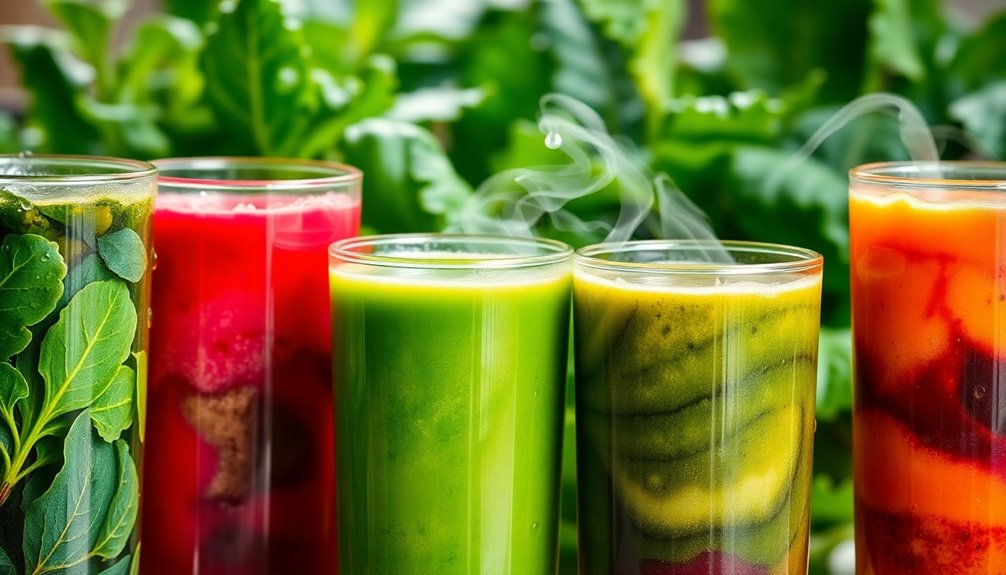
Antioxidants are vital for your body's cellular protection, and organic vegetable juices are a rich source of them. These juices deliver a variety of antioxidants from fruits, vegetables, herbs, and spices, helping to guard your cells against damage caused by free radicals.
By reducing oxidative stress, antioxidants can play a role in preventing chronic diseases like cancer and heart disease. When you choose organic produce, you often get higher levels of these protective compounds, as organic fruits and vegetables can contain up to six times more antioxidants than conventional options.
This organic advantage not only fights signs of aging but also supports your overall health by neutralizing free radicals and promoting cellular wellness. Additionally, these juices are often rich in vitamins that further enhance their health benefits. Make organic vegetable juices a part of your routine for maximum benefits.
Boosted Vitamin Content for Immune Health
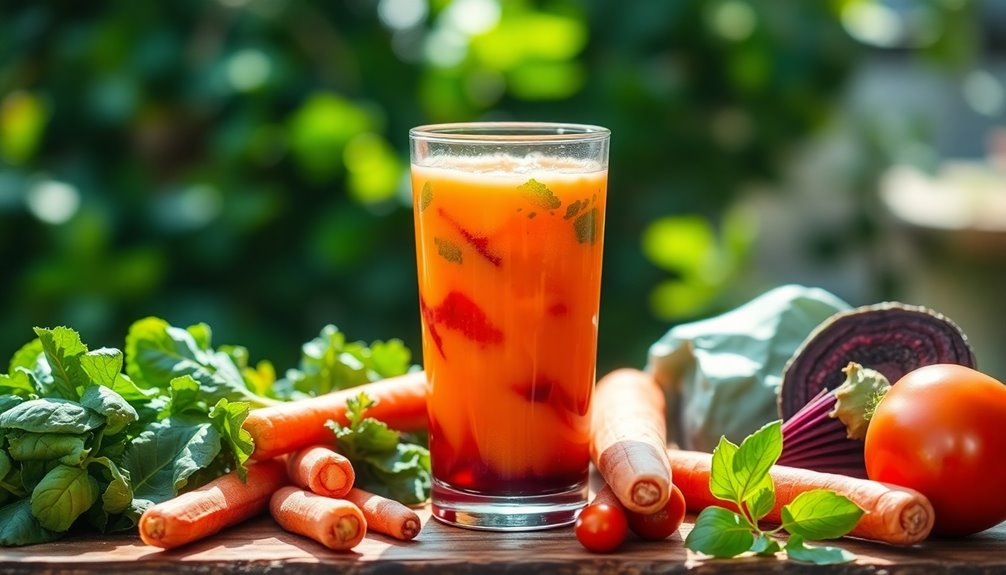
Incorporating organic vegetable juices into your diet not only enhances your antioxidant intake but also significantly boosts your vitamin content, particularly vitamins A and C.
An 8 fl oz serving provides about 58% of your Daily Value for vitamin A, crucial for maintaining healthy vision and immune function. Vitamin C plays an essential role by promoting white blood cell production to fight infections. Additionally, this juice is a good source of Vitamin C, providing 80% of your Daily Value, which further supports your immune system. Consuming organic vegetable juice can also help reduce the risk of infections, as it supplies your body with vital nutrients that enhance immune responses.
The concentrated nutrients in organic juices enhance absorption, making it easier for your body to utilize these vitamins effectively. This nutrient synergy helps neutralize harmful free radicals, further supporting your immune health.
Regularly drinking organic vegetable juice can help prevent deficiencies and fill dietary gaps, ensuring you stay strong and healthy.
Essential Minerals for Bodily Functions
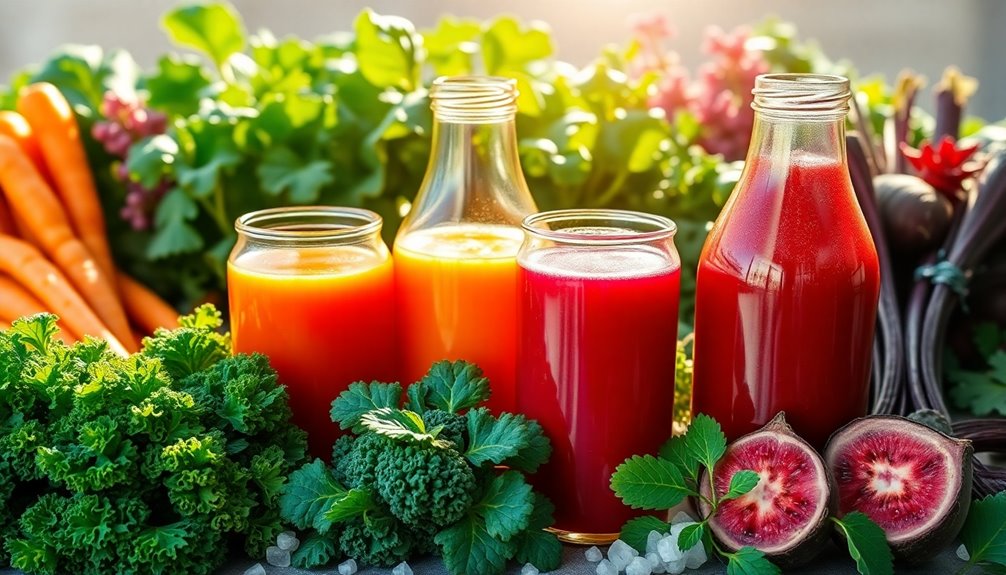
While many people focus on vitamins for their health, essential minerals play an equally important role in supporting bodily functions. Calcium and phosphorus are vital for strong bones and teeth, while magnesium and potassium aid in muscle contraction and nerve function. These minerals ensure your muscles work effectively and your nerves transmit signals smoothly. Major minerals also assist in maintaining acid-base balance and regulating body processes, which is crucial for overall health. Phosphorus also helps release energy from food, keeping you energized throughout the day. Additionally, consuming low carb foods can help support the intake of these essential minerals. Maintaining a balance of these minerals is crucial for overall health; they help prevent deficiencies that can lead to chronic diseases. You can easily get these nutrients from organic vegetable juice, which often contains a mix of vegetables rich in calcium, potassium, and magnesium, making it a smart addition to your diet.
Phytochemicals to Lower Chronic Disease Risk
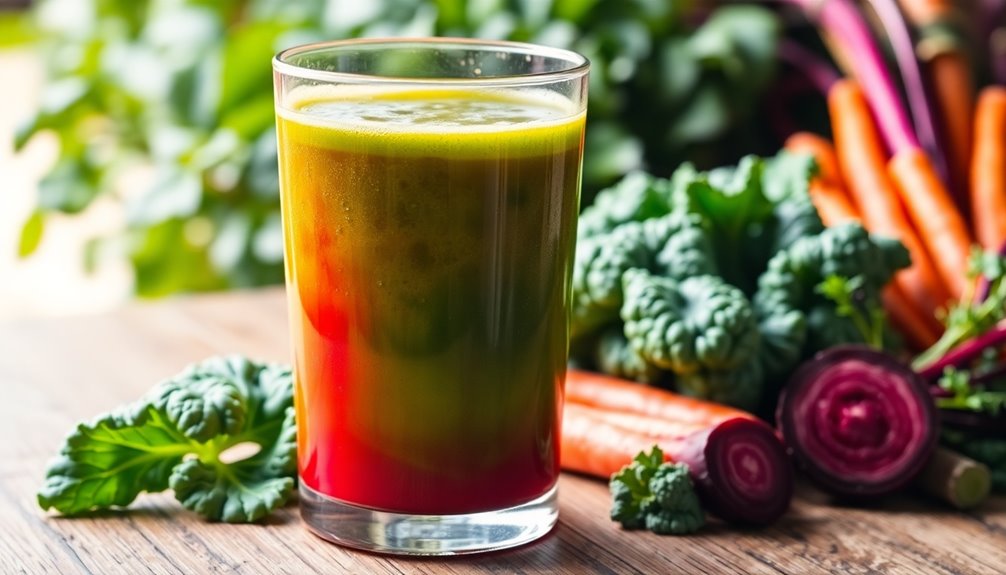
Phytochemicals, the powerful compounds found in plant-based foods, play a crucial role in lowering the risk of chronic diseases. These bioactive compounds, present in vegetables and fruits, have antioxidant properties that help combat free radicals, reducing inflammation and oxidative stress. Recent research highlights the potential role of phytochemicals in improving endothelial function and increasing vascular blood flow. Additionally, the health benefits of antioxidants found in organic vegetable juice can further bolster your body's defenses against chronic illnesses.
By incorporating various plant-based foods into your diet, you maximize your phytochemical intake and their protective benefits. For instance, flavonoids and carotenoids support heart health and vision, while isoflavones from soybeans may inhibit tumor growth.
Regular consumption of organic vegetable juice, rich in these compounds, can enhance your immune function and overall well-being. By choosing organic options, you avoid synthetic pesticides, ensuring you're getting the most potent phytochemicals to help lower your chronic disease risk.
Convenient Way to Increase Vegetable Intake
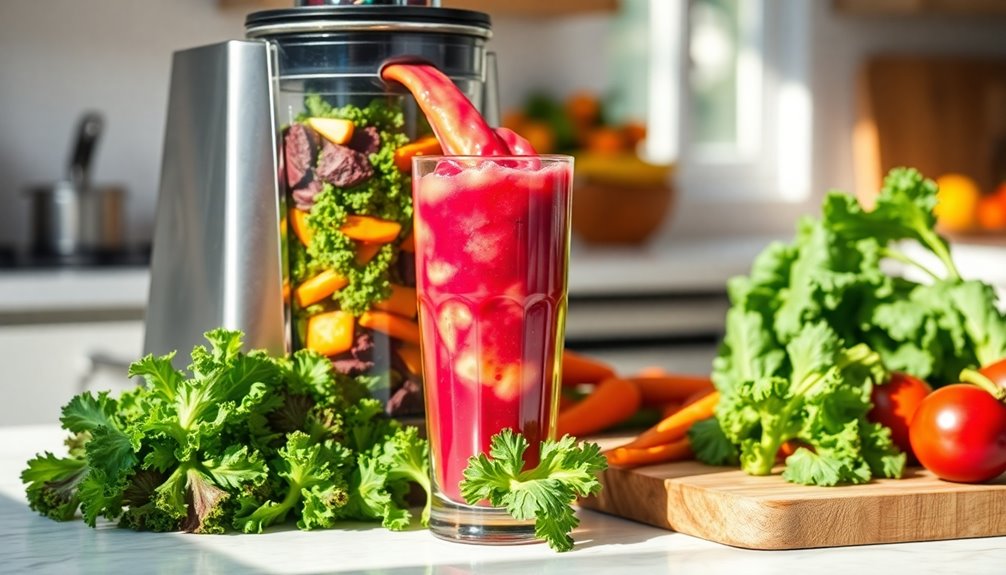
Organic vegetable juice offers a practical solution for boosting your vegetable intake effortlessly.
It's easy to consume, making it perfect for your busy schedule. You can quickly enjoy a high volume of vegetables in just a single serving, ensuring you get a concentrated dose of essential vitamins and minerals. Additionally, green juices can help maintain body alkalinity, which is important for overall health.
Plus, the versatility of vegetable juice allows you to mix various fruits and vegetables, creating delicious, nutritious recipes that never get boring.
By juicing, you also help reduce food waste, utilizing parts of vegetables that might otherwise be discarded.
Incorporating organic vegetable juice into your diet not only enhances your nutrient intake but also simplifies your journey toward healthier eating habits. By drinking organic vegetable juice regularly, you can easily access a concentrated source of vitamins, minerals, and antioxidants that support overall health. The organic vegetable juice benefits extend beyond just nourishment; they also aid in digestion and boost your immune system. Moreover, incorporating this vibrant beverage into your meals can inspire you to choose more fresh and wholesome food options throughout the day.
Supports Digestive Health and Gut Bacteria
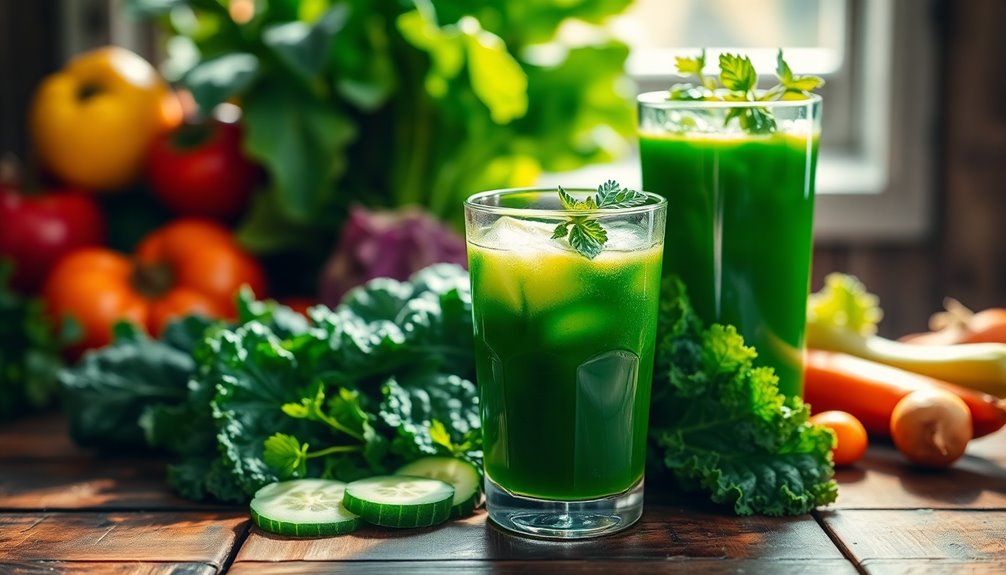
When you incorporate organic vegetable juice into your diet, you not only enhance your nutrient intake but also support your digestive health and gut bacteria. The reduced fiber content makes it easier for your body to absorb essential nutrients, especially if you have digestive issues. Raw vegetable enzymes in the juice aid in breaking down food, promoting better digestion. Plus, the gut-friendly nutrients, including probiotics and phytonutrients, help nurture healthy gut bacteria and reduce inflammation. The alkalizing effects can balance stomach acidity, alleviating symptoms like acid reflux. Additionally, cold-pressed juices retain maximum nutrients, ensuring that your body receives the full spectrum of benefits from the vegetables consumed.
Aiding Weight Management and Healthy Living
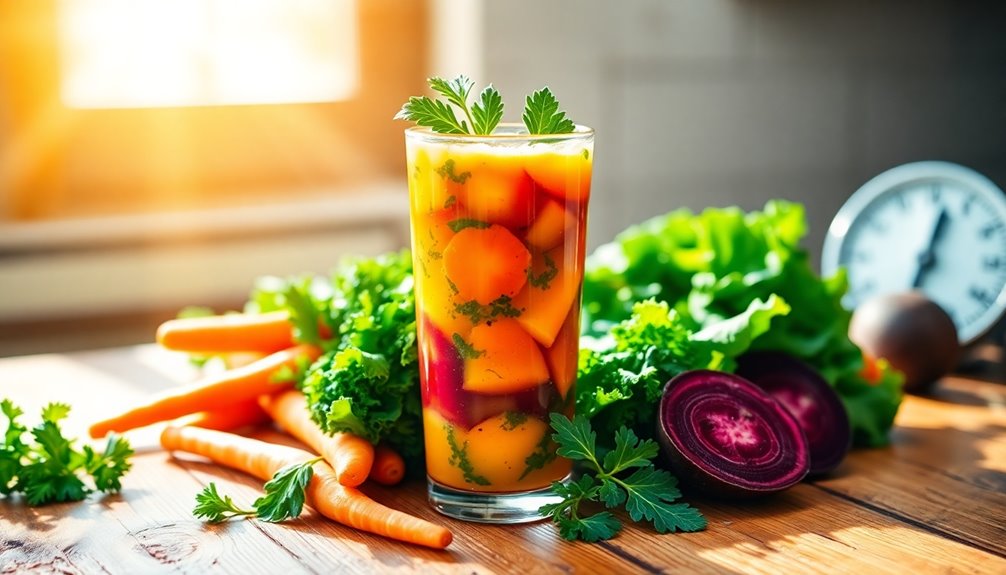
As you look for ways to manage your weight and enhance your overall health, incorporating organic vegetable juice into your daily routine can be a game-changer.
These juices are low in calories, making them a smart choice for weight management. They can help boost your metabolism with ingredients like iodine and zinc, while their nutrient-rich profile may suppress your appetite, keeping you feeling full longer. Additionally, increased nutrient intake from vegetable juices can further support your health goals by providing essential vitamins and minerals. Research shows that consuming low-tempo music while enjoying your juice can enhance relaxation and mood, making it an even more enjoyable experience.
Plus, vegetable juices serve as a convenient snack, offering quick nutrition without the extra calories. While they lack fiber, they deliver essential vitamins and minerals that support your overall well-being.
Reduced Pesticide Exposure With Organic Choices
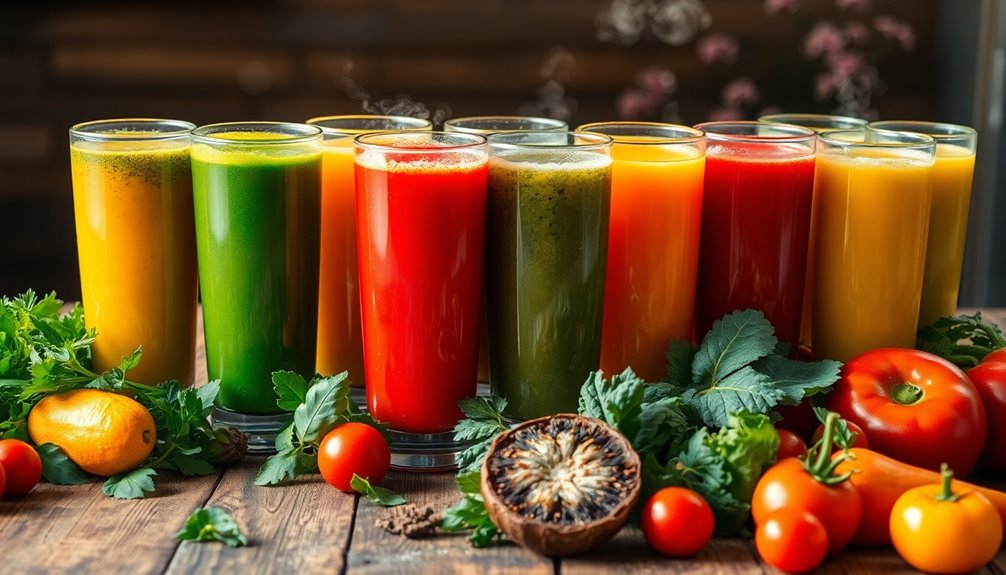
Incorporating organic vegetable juice into your diet not only supports weight management but also significantly reduces your exposure to harmful pesticides. Organic produce consistently shows lower pesticide residues than non-organic options, giving you peace of mind. When you switch to an organic diet, you'll experience immediate protection against these harmful chemicals, lowering your health risks associated with pesticide consumption. Notably, studies have shown that glyphosate levels in children significantly decrease when they switch to an organic diet, underscoring the importance of organic choices for safeguarding their health. Children are especially vulnerable, so choosing organic can safeguard their health in the long run. Plus, USDA Certified Organic standards ensure minimal synthetic pesticide use, making it a smart choice for both your health and the environment.
Nutrient Preservation Through Cold-Pressing
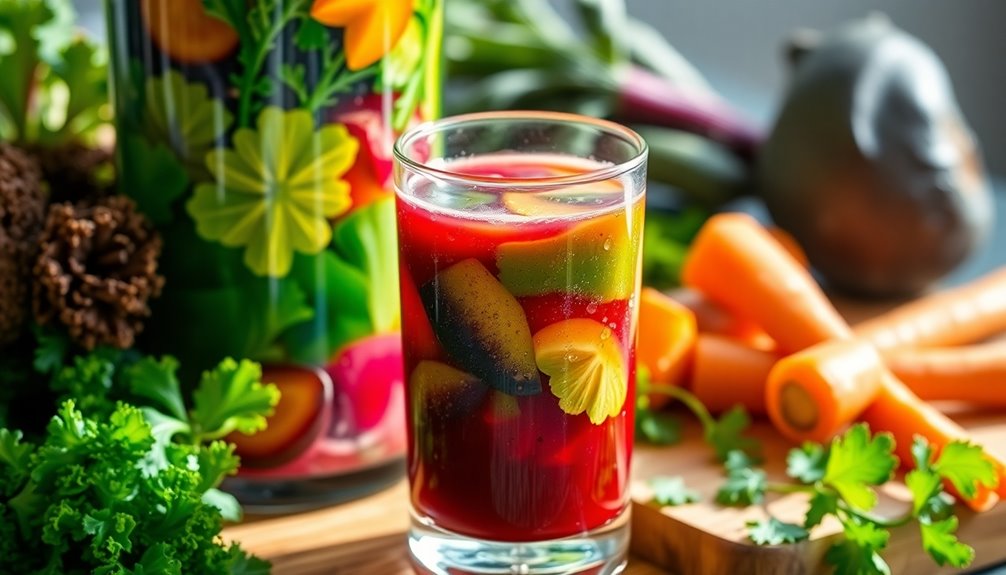
Cold-pressing your vegetable juice is a game-changer for nutrient preservation, ensuring you get the maximum benefits from your produce. This method retains more vitamins and minerals than traditional juicing, making your drink a powerhouse of nutrients. The absence of heat in cold-pressing preserves essential enzymes crucial for digestion and nutrient absorption. You'll also enjoy higher antioxidant levels, thanks to minimal oxidation during the process. Plus, cold-pressed juices contain no added preservatives, maintaining their natural nutritional value. With better bioavailability, your body can absorb these nutrients more effectively. Additionally, cold pressing minimizes oxygen and heat exposure, which further enhances the nutritional content of your juice.
Enhancing Energy and Endurance for Active Lifestyles
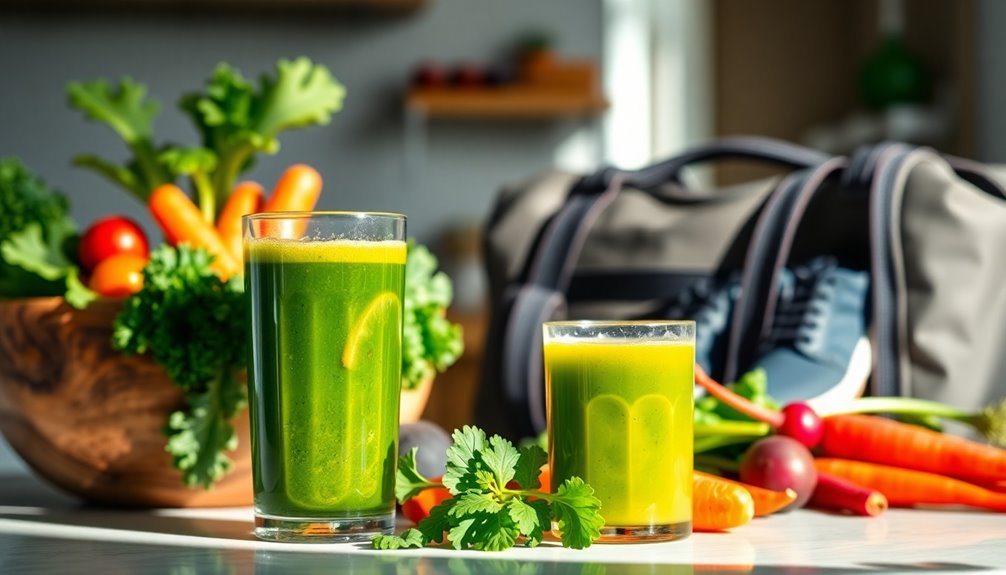
You've harnessed the power of nutrient-rich cold-pressed juices, and now it's time to explore how they can elevate your energy and endurance.
These green juices provide a natural energy boost, thanks to high vitamin C levels that enhance iron absorption and energy production. Unlike quick stimulants, they offer a gradual energy release, minimizing crashes. The nutrient-rich composition of these juices ensures that your body receives essential vitamins and minerals for optimal performance. Additionally, consuming juice cleanses can help reduce calorie intake while providing essential nutrients.
The antioxidants combat oxidative stress, keeping fatigue at bay. Leafy greens improve blood flow and oxygen delivery, enhancing your endurance during workouts.
Beetroot juice's nitrates convert to nitric oxide, reducing fatigue. With convenient nutrient intake, these juices support muscle recovery and reduce post-exercise soreness, optimizing your performance.
Integrate organic vegetable juice into your routine for sustained energy and improved athletic capabilities.
Frequently Asked Questions
Can I Make Vegetable Juice at Home Easily?
Yes, you can easily make vegetable juice at home! Start by selecting your favorite vegetables like carrots, tomatoes, or cucumbers.
Blend them together, and if you prefer a smoother texture, strain the juice. Feel free to enhance the flavor with honey or hot sauce.
You can customize it based on your taste and dietary needs. With just a blender and a few ingredients, you'll enjoy fresh, nutritious juice in no time!
How Long Can I Store Organic Vegetable Juice?
Did you know that freshly made organic vegetable juice can lose its quality within just 24 hours?
To store your juice effectively, keep it in the fridge and aim to consume it within 24-48 hours. If you use a masticating juicer, you might stretch it to 48 hours, especially if you add citrus.
Using vacuum containers can also help, extending freshness by reducing oxidation. Always check for signs of spoilage before drinking!
What Are the Best Vegetables for Juicing?
When you're looking for the best vegetables for juicing, consider kale for its superfood status and earthy flavor.
Spinach is versatile with a mild taste, while carrots add sweetness and smoothness.
Beets bring vibrant color and earthiness, and celery offers a refreshing, peppery kick.
Don't forget cucumbers for hydration and zucchini for a mild base.
Experimenting with these vegetables can lead to delicious, nutrient-packed juices that fit your taste.
Is Vegetable Juice Suitable for Kids?
You might wonder if vegetable juice is suitable for kids. The truth is, it can be a healthy addition to their diet when given in moderation.
Vegetable juice offers essential vitamins and minerals, while being lower in sugar than fruit juice. However, it shouldn't replace whole vegetables or be used as a meal substitute.
Always dilute it, monitor portions, and consult a healthcare provider before introducing it to ensure it fits your child's needs.
Can Vegetable Juice Replace Whole Vegetables in My Diet?
You can't rely solely on vegetable juice to replace whole vegetables in your diet.
While juices offer easier nutrient absorption and convenience, they lack the essential fiber whole vegetables provide, which is crucial for digestive health.
Juicing can complement your diet, but it shouldn't substitute for whole veggies.
Aim to incorporate both into your meals for a balanced intake of nutrients and to support overall health effectively.
Conclusion
Incorporating organic vegetable juice into your diet is a game-changer. It's like having a superhero in a bottle, packed with antioxidants, vitamins, and minerals that boost your health and energy levels. You're not just quenching your thirst; you're fueling your body with nature's best. With every sip, you're lowering your risk of chronic diseases while enjoying a delicious and convenient way to meet your veggie goals. So, grab that juice and feel the difference in your daily life!
Cindy thoroughly researches juicing trends, techniques, and recipes to provide readers with practical advice and inspiration. Her writing style is accessible, engaging, and designed to make complex concepts easy to understand. Cindy’s dedication to promoting the advantages of juicing shines through her work, empowering readers to make positive changes in their lives through the simple act of juicing.

